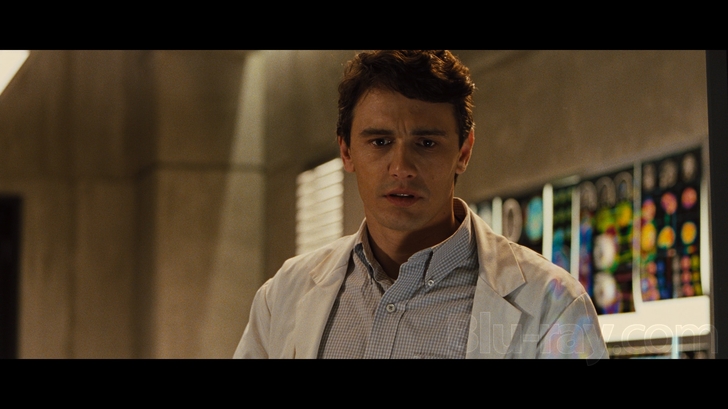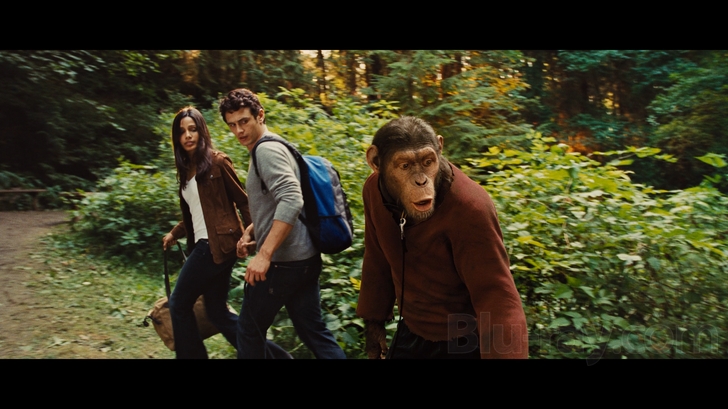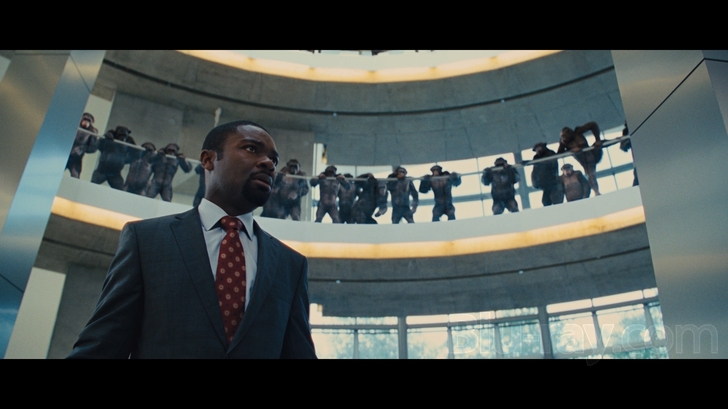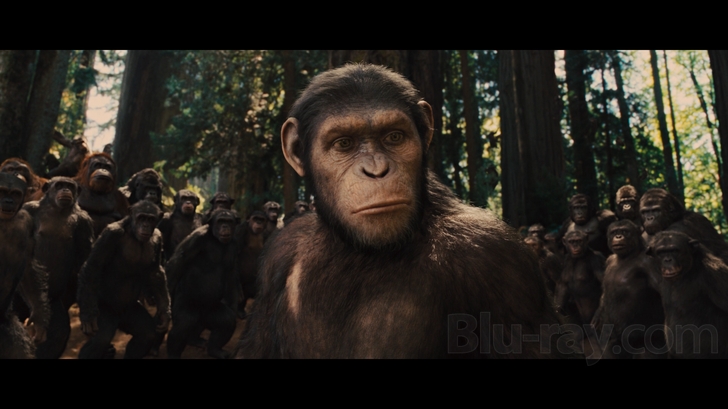Rise of the Planet of the Apes Blu-ray Movie
HomeRise of the Planet of the Apes Blu-ray Movie 
Blu-ray + DVD + Digital Copy20th Century Fox | 2011 | 105 min | Rated PG-13 | Dec 13, 2011

Movie rating
7.8 | / 10 |
Blu-ray rating
| Users | 4.5 | |
| Reviewer | 3.5 | |
| Overall | 4.4 |
Overview
Rise of the Planet of the Apes (2011)
An origin story set in present day San Francisco. Our greatest discovery will become the world's greatest threat when a scientist on the verge of a medical breakthrough begins testing on a young chimpanzee named Caesar. But when the chimp develops human-like intelligence and emotions, an epic battle ensues to determine the dominant species on the planet.
Starring: James Franco, Freida Pinto, John Lithgow, Brian Cox, Tom FeltonDirector: Rupert Wyatt
| Action | Uncertain |
| Sci-Fi | Uncertain |
| Thriller | Uncertain |
| Drama | Uncertain |
Specifications
Video
Video codec: MPEG-4 AVC
Video resolution: 1080p
Aspect ratio: 2.35:1
Original aspect ratio: 2.39:1
Audio
English: DTS-HD Master Audio 5.1 (48kHz, 24-bit)
English: Dolby Digital 5.1 (448 kbps)
Spanish: Dolby Digital 5.1 (448 kbps)
French: Dolby Digital 5.1 (448 kbps)
The English DD 5.1 track is Descriptive.
Subtitles
English SDH, Spanish
Discs
50GB Blu-ray Disc
Two-disc set (1 BD, 1 DVD)
Digital copy (on disc)
DVD copy
BD-Live
D-Box
Packaging
Slipcover in original pressing
Playback
Region A (locked)
Review
Rating summary
| Movie | 3.5 | |
| Video | 4.5 | |
| Audio | 4.5 | |
| Extras | 3.0 | |
| Overall | 3.5 |
Rise of the Planet of the Apes Blu-ray Movie Review
A reboot that shows some promise for a flagging franchise.
Reviewed by Casey Broadwater December 13, 2011The five original Planet of the Apes films—and even the bafflingly bad 2001 Tim Burton remake—are essentially B-movies with unobtainable A-
level aspirations. They’re campy and far out and (mostly) entertaining, of course, but you can’t take them seriously at all. Charlton Heston in a
loincloth? Those goofy rubber masks? You damn dirty apes? I mean, monkey suits aside, we’re not talking 2001: A Space Odyssey-
grade sci-fi here.
Today’s audiences are a bit more savvy, though, and for this year’s unlikely reboot—Rise of the Planet of the Apes—20th Century Fox has
opted to take the series in a slightly more sophisticated direction. Operative word: slightly. Yes, there are still talking apes, comically
overambitious scientists, and a chest-pounding simian uprising, but you get the keen impression that director Rupert Wyatt and screenwriters Rick
Jaffa and Amanda Silver wanted to make this new film seem as plausible as possible, starting with the world as we know it and gradually increasing the
sci-fi dosage, hoping that by the time the apes go head-to-head with the San Francisco P.D. on the Golden Gate Bridge, we’ve thoroughly suspended
our disbelief. There’s a sense of realism here that the previous movies could never even have tried to muster. Much of the credit goes to the
famed WETA Workshop—which created the most realistic CGI apes yet seen on screen—and motion-capture all-star Andy Serkis, who gives a terrific
performance as Caesar, the chimpanzee whose mental state is artificially enhanced by a lucrative wonderdrug.

Caesar
Though it borrows bits and pieces from most of the films that came before, especially 1972’s Conquest of the Planet of the Apes, Rise starts from scratch and asks us to forget that the other movies even exist. (“Done,” I say.) There’s no attempt to work this film into the franchise’s pre-existing timeline—which is rather shaky to begin with—and certainly no ties to Burton’s aborted reboot. This is a baggage-free outing and—if 20th Century Fox gets its wish—a clean start for a whole new series. There’s already buzz about a sequel moving forward.
James Franco stars as Will Rodman, a scientist doing Alzheimer’s research at an ultra-high-tech pharmaceutical laboratory outside San Francisco. His elderly dad, Charles—played tenderly by John Lithgow—is suffering from progressively worsening dementia, and Will aims to stop the disease in its tracks with a new drug/virus called ALZ-112, which has caused the I.Q. of his chimpanzee test subjects to shoot off the charts. There’s only one problem—when a mother chimp goes berserk trying to protect her newborn son, the company’s hardass CEO (David Oyelowo) mistakes the virus for the cause of the aggression and terminates the program, ordering all of the test chimps to be put down.
Will can’t bring himself to kill the infant—who genetically inherited the increased intelligence from his mother—so he brings him home, names him Caesar, teaches him sign language, and raises him like a child, much like the researchers in the documentary Project Nim. It soon becomes apparent that Caesar has a highly advanced consciousness; he’s capable of articulating complicated thoughts, he displays empathy—see the scene where he re-teaches Will’s dad the proper way to hold a fork—and he has an inherent sense of self. As he gets older, he even begins to assert his personhood. When Will tries to load him into the rear cargo section of his Jeep station wagon, Caesar ambles into a proper seat and signs defensively, “Am I a pet?” His self-awareness becomes truly tragic when—after beating up a neighbor in Charles’ defense—he’s taken out of Will’s custody and imprisoned in a crowded and filthy primate “sanctuary.”
We should stop here and point out that Andy Serkis—who, though motion capture technology, gives real movement and expression to the otherwise computer-generated creation of Caesar—is brilliant and absolutely the soul of the film. He becomes a chimp, loping around on all fours, baring his teeth, and moving with that loose gait that’s so particular to primates. The uncanny valley hasn’t quite been crossed, but there’s something about Caesar that makes him this close to being totally believable. I think it’s his eyes; they convey the genuine depth of thought that’s so necessary to making Caesar a character we identify with and support.
Since we have no experience with highly sentient creatures other than ourselves, Caesar’s intelligence begs several provocative questions: What is he? What rights does he have? Is it ethically acceptable for him to be owned? The film poses these and leaves them for the audience to ponder, along with other ideas the script raises—most notably speciesism, the morality of animal testing, and the evils of a pharmaceutical industry interested more in profits than saving lives. Rise of the Planet of the Apes only grazes the surface of these topics— this is still a summer blockbuster after all—but it’s good to see a big-budget action movie that leaves you thinking instead of simply numb and shell- shocked from endless superhero-assisted explosions.
That’s not to say Rise is short on intensity. This is a briskly-paced film that has several thrilling action sequences, including the aforementioned assault on the Golden Gate Bridge, which pits a tribe of “awakened” great apes against a SWAT team, a helicopter sniper, and San Fran’s horseback-mounted, nightstick-swinging finest. I wouldn’t want to give away the point-A-to-point-B details of how Caesar and the apes make their great escape, but let’s just say it involves Caesar getting his sneaky paws on an advanced strain of the consciousness-raising virus. Also, look out for Tom Felton—yes, none other than Harry Potter’s Draco Malfoy—as a sadistic primate sanctuary guard who reprises Heston’s damn dirty apes line and gets a literally shocking comeuppance in return. Looks like Felton has been permanently typecast as “cruel, self-important ass whom everyone hates.”
The film gets a lot right—the special effects, the more realistic tone, Andy Serkis’ performance—but it’s hobbled by two things. First, the human characters are barely developed and almost completely trivial to the plot. This is partially intentional, I’m sure, as our sympathies are supposed to lie primarily with Caesar, but it would help if Will was more than just your average, over-ambitious B-movie scientist. And I haven’t even mentioned his primatologist girlfriend, Caroline (Freida Pinto), simply because she doesn’t really do anything worth noting. The second stumbling block is an overwhelming sense of incompleteness. This story obviously isn’t over, and at the end we’re left with a big, shoulder-shrugging well, what’s next? Your move, 20th Century Fox. You’ve got me hooked, now don’t leave me hanging.
Rise of the Planet of the Apes Blu-ray Movie, Video Quality 

Rise of the Planet of the Apes swings onto Blu-ray with the kind of top-tier high definition presentation you expect from a big budget summer blockbuster. The dual-layer 50 GB disc features a 1080p/AVC-encoded transfer—framed in the film's native 2:35:1 aspect ratio—that's simply gorgeous from start to finish. Considering all of the special effects wizardry undertaken by the WETA Workshop, you'd think Rise would've been shot digitally, but no—it was actually filmed on fine-grained 35mm stock, and that warm, natural filmic texture is still visible here, untouched by noise reduction or edge enhancement. The sense of clarity you get from the picture is wonderful. Human skin and clothing textures are refined, but perhaps more impressive are WETA's CGI creations, which show a tremendous amount of detail, down to the individual hairs on the apes' faces. I noticed a few shots that looked slightly soft, but I think most of these could probably be attributed to the digital compositing process. Color is richly saturated too, with glowing skin tones, deep forest greens, and a generally warm cast, all bolstered by dark blacks and punchy contrast. Finally, though there are plenty of spots where compression issues could've flared up—specifically, dark interior scenes, where you anticipate noise, and the rolling fog over the Golden Gate bridge, where banding might be likely—there are no artifact problems to report. This is a Grade-A transfer.
Rise of the Planet of the Apes Blu-ray Movie, Audio Quality 

Likewise, I have nothing but good to say about the film's lossless DTS-HD Master Audio 5.1 surround track, which is dynamically aggressive and consistently engaging. From the very first scene, where you hear frightened birds explode in unison from out of the jungle canopy, you get the feeling you're in for some powerful and carefully considered sound design. Though the mix is anchored up front, the rear channels stay active throughout, supporting the ongoing action with pinpoint directionality. Obviously, you'll be hearing a lot of ape sounds. Apes freaking out in their cages. Apes wreaking havoc in the laboratory. Apes swinging and screaming and bursting through plate glass windows. The ambience and effects are weighty and forceful, without ever feeling stagy or artificial. The climactic face-off on the Golden Gate Bridge sounds especially fantastic, with helicopter rotors thrumming through the surround channels, massive outward-rippling explosions, and bullets spraying in every direction. The atmosphere is complemented by Patrick Doyle's big and unapologetically assertive score, and if you listen closely you can even hear the oooo-aahhh-aahhh-eeee- eeee cadence of ape-speak in the string arrangements. In the midst of all this, dialogue remains clean, balanced, and easy to understand. The disc also includes an English Dolby Digital 5.1 descriptive audio track, French and Spanish Dolby Digital 5.1 dubs, and optional English SDH and Spanish subtitles.
Rise of the Planet of the Apes Blu-ray Movie, Special Features and Extras 

- Audio Commentaries: The disc features two audio commentaries, the first by director Rupert Wyatt, who gets into the technical nitty-gritty of the making of the film, and the second with writers Rick Jaffa and Amanda Silver, who—as you'd expect—talk a lot about the characters, themes, and links with the previous films.
- Deleted Scenes (1080p, 12:00): None of the twelve deleted scenes here feature finished animation, but that just means we get to see Andy Serkis running around in his badass motion-capture suit.
- Mythology of the Apes (1080p, 7:11): The filmmakers and stars talk about their respect for the original series and how this new reimagining draws inspiration from the previous films.
- The Genius of Andy Serkis (1080p, 7:48): A celebration of Andy Serkis, who has almost single-handedly changed motion-capture technology.
- A New Generation of Apes (1080p, 9:41): The film's creators discuss the technical innovations required to bring Caesar's journey to the screen.
- Scene Breakdown (1080p, 1:34): While watching the scene, you can use the buttons on your remote to toggle through early animation, performance capture, and final scene reference views.
- Character Concept Art Gallery (1080p): A user-directed gallery with concept images of seven of the apes featured in the film.
- Breaking Motion Capture Boundaries (1080p, 8:43): A featurette showing how the Golden Gate Bridge finale was shot and compiled.
- Composing the Score with Patrick Doyle (1080p, 8:07): Doyle talks about the process of scoring the film, including using the natural cadence of chimp vocalizations in the main motif.
- The Great Apes (1080p, 22:37): A three-part informational piece on chimpanzees, gorillas, and orangutans, detailing their habitats, diets, and social structures.
- Theatrical Trailers (1080p, 6:29)
- Sneak Peaks (1080p, 10:11): Promo trailers for Machine Gun Preacher, Immortals, Another Earth, There Be Dragons, and the FX Network.
- BD-Live Exclusive - Ape School (720p, 2:00): The film's stunt coordinator explains the process of training the motion-capture actors to behave like apes.
Rise of the Planet of the Apes Blu-ray Movie, Overall Score and Recommendation 

A reboot of the Planet of the Apes series was honestly the last thing I wanted from 20th Century Fox—after the disaster that was Tim Burton's 2001 remake—but lo and behold, Rise of the Planet of the Apes is actually okay. Granted, it'll be a lot better in retrospect if Fox comes through with a bigger, better sequel that expands on the ideas started here, but even if this is the last Apes movie we see for a while, I'm fairly happy with how it turned out. The film looks and sounds fantastic on Blu-ray, and comes with a generous supply of value-expanding special features, including two audio commentaries. Recommended!
Other editions
Rise of the Planet of the Apes: Other Editions

Rise of the Planet of the Apes 4K
2011

Rise of the Planet of the Apes
2011

Rise of the Planet of the Apes
2011

Rise of the Planet of the Apes
2011

Rise of the Planet of the Apes
2011

Rise of the Planet of the Apes
Movie Only Edition
2011

Rise of the Planet of the Apes
2011
Similar titles
Similar titles you might also like

Dawn of the Planet of the Apes 4K
2014

Real Steel
2011

District 9 4K
2009

Hulk 4K
2003

War for the Planet of the Apes
2017

Resident Evil: Afterlife 3D
2010

Pacific Rim: Uprising 4K
2018

Elysium 4K
2013

Lucy 4K
2014

Chappie
2015

Lockout
Unrated Edition
2012

Alien: Resurrection
1997

Transcendence
2014

V for Vendetta 4K
2005

Beneath the Planet of the Apes
1970

Escape From the Planet of the Apes
1971

Transformers: Dark of the Moon
2011

The Terminator 4K
40th Anniversary
1984

Alien³
1992

Transformers: Revenge of the Fallen 4K
2009